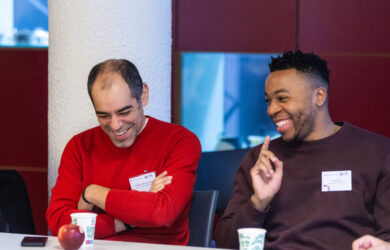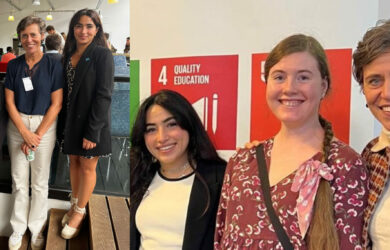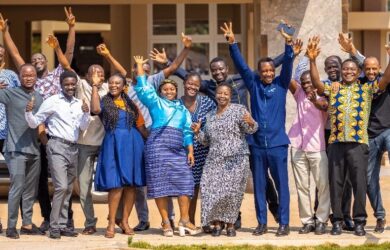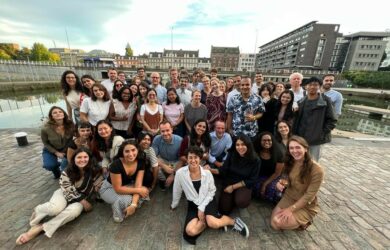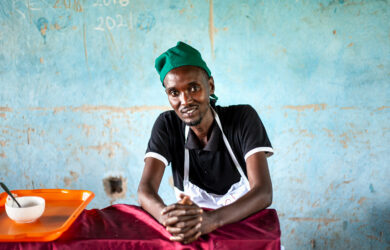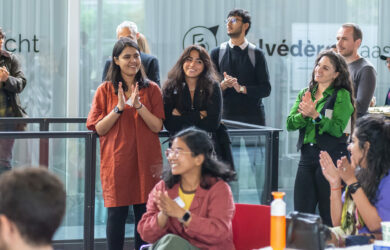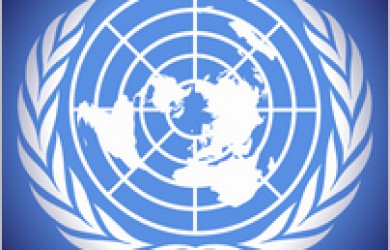- ABOUT US
- RESEARCH
- EDUCATION
- The Graduate School
- PhD Programme
- MSc Programmes
- Capacity Development
- News
- Design and Evaluation of Public Policies (DEPP)
- Design and Evaluation of Innovation Policies (DEIP)
- Evidence-Based Policy Research Methods (EPRM)
- Migration Management Diploma Programme (MMDP)
- Moving the Migration Policy Agenda Forward (MMPAF)
- Online Courses
- Short Courses (Masters)
- Tailor-made programmes
- UNU-MERIT, ITU Academy Training Centre
- Alumni
- Academic Funding
- NEWS
- EVENTS
- PUBLICATIONS
- LIBRARY
Thoughts from one of our graduating dual career PhD fellows and his supervisors
28 June 2024
On 3 July 2024, Philipp König (dual career PhD fellow at UNU-MERIT) will defend his thesis, entitled ‘Towards Collaborative Accountability – Changing Patterns of Accountability in International Development Finance’. In this blog, Philipp looks back on his PhD journey, together with reflections from his promoter Prof. Dr. Mark Bevir and supervisor Dr. Mindel van de Laar. Accountability mechanisms of development finance institutions Philipp König (PK): The focus of my the...
Continue Reading →Celebrating two years of a PhD journey: Reflections from our dual career fellows
08 April 2024
By Ari Perdana, dual career PhD fellow at UNU-MERIT In March this year, the 2022 cohort of UNU-MERIT’s dual career (DC) PhD fellows celebrated the second anniversary of the start of their PhDs. Two weeks ago, over dinner in a noodle restaurant near Maastricht’s Jekerkwartier, Adam Adou, Rodrigo López Barreda, Karin Schmidt Martinez, Giovanna Mazzeo Ortolani, Abdinassir Sagar and I came together to mark the occasion and to look back on our journeys so far. March and September are the two moments ...
Continue Reading →Research Week at UNU-MERIT: An inside perspective from our PhD Office
28 March 2024
Each year in March, UNU-MERIT’s PhD Office organizes a week-long event known as Research Week, offering a dedicated time for PhD fellows to focus on their research and connect with peers. But what exactly does the Research Week entail, and how does it benefit the institute as a whole? Basking in the afterglow of this year’s edition (18 – 22 March), our PhD Office team – comprised of Micheline Goedhuys, Hampton Wong, Julia Walczyk and Soha Youssef – share their thoughts on what ...
Continue Reading →Summer of Science Program: Supporting young Indigenous female researchers to flourish
07 February 2024
Michelle González Amador – who is currently completing her full-time PhD at UNU-MERIT – has been involved with the multi-institutional initiative Mechanism Design for Social Good (MD4SG) for several years and was previously the organiser of the Latin America and Caribbean Working Group. One of the projects that emerged from this working group was a Summer of Science Program, the goal of which is to support female students from Indigenous communities in Mexico as they design and execu...
Continue Reading →How four UNU-MERIT PhD alumni redefined ‘research stay’ in Ghana
01 February 2024
By Victor Osei Kwadwo, researcher and lecturer at UNU-MERIT In March 2023, three friends and I – all of us graduates of UNU-MERIT’s PhD programme – were thrilled when we stumbled upon a research fellowship opportunity in Africa, our home continent. Unfortunately, it turned out that the call was for individual three-month research stays. Our lives (some of us being parents) and newly launched careers simply wouldn’t bend that far. But, as any good scholar knows, constraints breed creativity...
Continue Reading →5 ways we made a difference in 2023
10 January 2024
When it comes to summarizing all that an institute as diverse as UNU-MERIT achieves in a year, where does one begin? Our work spans education programmes and capacity development efforts to media engagement and thought leadership to research projects big and small, and so much more. Nevertheless, we’ve done our best to give a snapshot of UNU-MERIT’s impact in 2023 through these five key contributions to sustainable development: Responded to the climate crisis Few parts of life fail t...
Continue Reading →Pairing photography and research for social change
04 January 2024
Researcher and photographer Mariajose Silva Vargas is about to complete her full-time PhD at UNU-MERIT (defending on 24 January) and now works as a Research and Policy Manager at Abdul Latif Jameel Poverty Action Lab Europe (J-PAL Europe). In this interview, she shares some highlights from both her photography work and her PhD journey, and explains how the two perfectly complemented each other. Mariajose’s online photography portfolio can be found on her personal website. What is the motiv...
Continue Reading →How to start a career at a multilateral development bank
11 October 2023
Tips and tricks from our dual career PhD fellows To kick off the 2023–2024 academic year, three of our dual career PhD fellows – Ari Perdana, Ilsa Meidina and Laisa Daza Obando – held a panel discussion about careers in multilateral development banks, describing their personal experiences of working in these organisations and offering advice for those wanting to enter the field. Here’s a short summary of what they had to share. What are multilateral development banks (MDBs) and what do they do? ...
Continue Reading →Inspiration, connection and collaboration: UNU-MERIT’s Internal Conference 2023
06 October 2023
On 28-29 September, UNU-MERIT held its annual Internal Conference — an intensive two-day gathering that convened all of our PhD fellows (both full-time and dual career), researchers and professors for an in-person research exchange. During this much-anticipated event, our academic community members showcased their scientific endeavours to their peers, received valuable feedback, gained new perspectives and inspiration from two esteemed external keynote speakers, and enjoyed a social evening out ...
Continue Reading →UNU-MERIT Newsletter
24 January 2023
Our quarterly newsletter rounds up the latest news and events from UNU-MERIT and its School of Governance. We explore the push and pull of international development: innovation through science and entrepreneurship, and governance through public policy analysis. ...
Continue Reading →Archives
Contact
UNU-MERIT
Boschstraat 24
6211 AX Maastricht
The Netherlands
T: +31 43 388 44 00
Email: info@merit.unu.edu
Boschstraat 24
6211 AX Maastricht
The Netherlands
T: +31 43 388 44 00
Email: info@merit.unu.edu
Partner sites
Newsletters
© 2024 UNU-MERIT | Maastricht University



